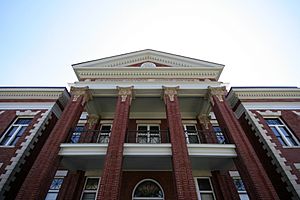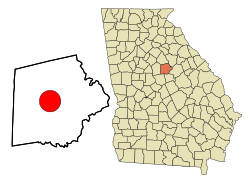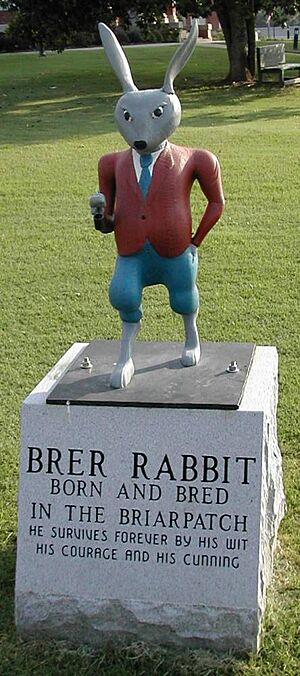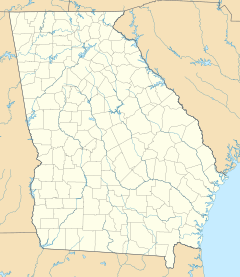Eatonton, Georgia facts for kids
Quick facts for kids
Eatonton
|
|||
|---|---|---|---|

Putnam County Courthouse in Eatonton
|
|||
|
|||

Location in Putnam County and the state of Georgia
|
|||
| Country | |||
| State | |||
| County | Putnam | ||
| Area | |||
| • Total | 20.61 sq mi (53.38 km2) | ||
| • Land | 20.51 sq mi (53.12 km2) | ||
| • Water | 0.10 sq mi (0.27 km2) | ||
| Elevation | 568 ft (173 m) | ||
| Population
(2020)
|
|||
| • Total | 6,307 | ||
| • Density | 307.52/sq mi (118.74/km2) | ||
| Time zone | UTC-5 (Eastern (EST)) | ||
| • Summer (DST) | UTC-4 (EDT) | ||
| ZIP codes |
31024
|
||
| Area code(s) | 706 | ||
| FIPS code | 13-26084 | ||
| GNIS feature ID | 0331628 | ||
| Website | City of Eatonton | ||

Eatonton is a city in Georgia, United States. It is the main city and government center (called the county seat) of Putnam County. In 2020, about 6,307 people lived there. The city got its name from William Eaton, who was a soldier and diplomat. The "ton" part of the name means "town" in English.
Contents
History of Eatonton
Ancient History
North of Eatonton, you can find the Rock Eagle Effigy Mound. This is an ancient site built by Native American people. It is a large mound shaped like a bird. It was made by people of the Woodland culture possibly 1,000 to 3,000 years ago. This site is very special because it is one of only two such mounds east of the Mississippi River. The University of Georgia manages the park where the mound is located.
Founding and Growth
Eatonton was founded in 1807. This happened after the American Revolutionary War, when many settlers moved west. They came to the Piedmont region to start cotton farms. Eatonton officially became a town in 1809 and then a city in 1879.
Important Events
In May 1919, several community buildings in Eatonton were destroyed by fire. On November 22, 1992, a very strong tornado hit the southern part of the city. This F4 tornado had winds up to 260 miles per hour. It caused a lot of damage to homes and businesses. Sadly, five people died and 86 were hurt.
Today, Eatonton is known as the "Dairy Capital of Georgia." This is because dairy farming is a very important industry there.
Where is Eatonton?
Eatonton is located in the middle of Georgia. You can find it at these coordinates: 33°19′35″N 83°23′16″W / 33.32639°N 83.38778°W.
Roads and Travel
The city is on U.S. Routes 129 and 441. These roads meet in Eatonton and form its western border.
- If you go north on U.S. 129/441, you will reach Madison in about 22 miles (35 km).
- Going south from Eatonton, U.S. 129 goes southwest to Gray (25 miles or 40 km).
- U.S. 441 goes southeast to Milledgeville (21 miles or 34 km).
Georgia State Routes 16 and 44 are the main roads through the center of Eatonton.
- GA-16 goes east to Sparta (27 miles or 43 km) and west to Monticello (18 miles or 29 km).
- GA-44 goes northeast to Greensboro (23 miles or 37 km).
Land and Water
The city covers about 20.7 square miles (53.6 square kilometers). Most of this area is land, with a small amount of water.
People in Eatonton
| Historical population | |||
|---|---|---|---|
| Census | Pop. | %± | |
| 1840 | 516 | — | |
| 1860 | 2,009 | — | |
| 1870 | 1,240 | −38.3% | |
| 1880 | 1,371 | 10.6% | |
| 1890 | 1,682 | 22.7% | |
| 1900 | 1,823 | 8.4% | |
| 1910 | 2,036 | 11.7% | |
| 1920 | 2,519 | 23.7% | |
| 1930 | 1,876 | −25.5% | |
| 1940 | 2,399 | 27.9% | |
| 1950 | 2,749 | 14.6% | |
| 1960 | 3,612 | 31.4% | |
| 1970 | 4,125 | 14.2% | |
| 1980 | 4,833 | 17.2% | |
| 1990 | 4,737 | −2.0% | |
| 2000 | 6,764 | 42.8% | |
| 2010 | 6,480 | −4.2% | |
| 2020 | 6,307 | −2.7% | |
| U.S. Decennial Census 1850-1870 1870-1880 1890-1910 1920-1930 1940 1950 1960 1970 1980 1990 2000 2010 |
|||
Here's a look at the different groups of people living in Eatonton in 2020:
| Race | Num. | Perc. |
|---|---|---|
| White (non-Hispanic) | 1,976 | 31.33% |
| Black or African American (non-Hispanic) | 3,553 | 56.33% |
| Native American | 10 | 0.16% |
| Asian | 26 | 0.41% |
| Other/Mixed | 158 | 2.51% |
| Hispanic or Latino | 584 | 9.26% |
In 2020, there were 6,307 people living in Eatonton. These people lived in 2,559 households, with 1,756 of them being families.
Schools in Eatonton
The Putnam County School District serves students from Headstart (preschool) up to twelfth grade. It has several schools:
- Putnam County Primary School
- Putnam County Elementary School
- Putnam County Middle School
- Putnam County High School
- Putnam County Achievement Academy (an alternative school)
The district has about 165 full-time teachers and more than 2,474 students. There is also a private Christian school called Gatewood Schools, which teaches children from K3 (preschool) through 12th grade.
- Gatewood Schools (K3-12)
Famous People from Eatonton
Many interesting people have connections to Eatonton:
- Vincent Hancock: An Olympic gold medalist in skeet shooting. He won gold medals in the 2008, 2012, and 2020 Summer Olympics. He lives in Eatonton and graduated from Gatewood Schools.
- Joel Chandler Harris: A journalist and author famous for his "Uncle Remus" stories.
- Louise Prudden Hunt (Mrs. B. W. Hunt): A poet from the 19th century.
- Henry Grady Weaver: The author of the book The Mainspring of Human Progress.
- Alice Walker: A famous author known for her novel The Color Purple and other books.
- David Driskell: An artist and a leading expert on African American art.
- S. Truett Cathy: The founder of the popular fast-food restaurant chain, Chick-fil-A.
- Thomas Adiel Sherwood: A judge who served on the Missouri Supreme Court from 1873 to 1902.
See also
 In Spanish: Eatonton para niños
In Spanish: Eatonton para niños





